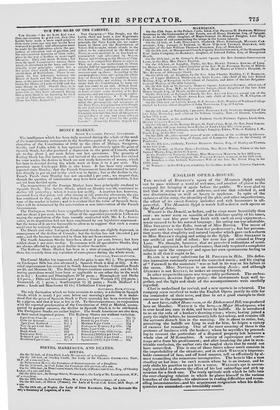ENGLISH OPERA-HOUSE.
THE revival of BARNETT'S opera of the Mountain Sylph ought not to pass without a word of welcome, and another of praise to the company for bringing it again before the public. We were glad to find that it attracted a good audience, and one that relished it, and was discriminating as well as lsearty in applause. In spite of the staleness of the story, the absurdity of the plot, and other imperfections, the effect of its sweet-flowing melodies and rich harmonies is all- powerful. The Mountain Sylph is worth half-a-dozen such operas as the Maid of Artois. WiLsoN is the Donald, as before, and he sings more beautifully than ever : we never were so sensible of the delicious quality of his tones, and never saw him pour them forth with such an easy enjoyment— music seemed to be his natural language : Ids acting too was admirable. Miss SHERRIFF is the Eolia, instead of Miss ROMER. The music of the part suits her voice better than her predecessor's ; but her persona- tion wants that simplicity and natural impulse which gave such a charm to Miss ROMER'S singing and acting in the Sylph. Miss SHERRIFF is WO artificial and full of effort: her taste has got vitiated at Drury Lane. We thought, however, that we perceived indications of sensi- bility and enjoyment in her performance, that only required a completer reliance upon the composer and upon her own spontaneous feeling to make it all that it ought to be. BLANb is a sorry substitute for H. Plithurs in Hela. His defee. tive intonation constantly marred the concerted music ; and his singing of" Farewell to the mountain " was as bad in its way as his failure in the scene. Miss NOVELLO is an interesting Jessie ; and although OXBERRY is not KEELEY, he makes an amusing Christie. In other respects the opera was res;.ectably performed. The orches- tra, however, deserves higher praise : the instruments kept well to- gether, and the light and shade of the accompaniments were carefully regarded. Clari is underlined for revival, and a new opera is in rehearsal. The company seem resolved to make the English Opera justify its title for the remainder of their term, and thus to set a good exsunple to their successor its the management. A new farce, called House-room, or the Dishonoured Bill, was produced bete on Monday. WiteNcti is the hero,—a Major Slenderpurse, who is over head and ears in debt, and beset by bailiffs. Ile is introduced to us on the sofa of a banker's drawing-room ; where, having joined a party the night before, he incontinently falls fast asleep, and remains till the servants disturb him in the morning. He is about to retire, but, perceiving the bailiff's are lying in wait for him, he feigns a variety of excuses for remaining. One of the most amusing of these is the pretence of business with the banker; whom he mystifies by proceed- ing to recount the particulars of a disputed property left between a whole clan of 11‘Konochies. A variety of equivoques and contre- temps arise from his predicament ; and after involving the plot in inex- tricable confusion, the author cuts the tangled skein that he could not have unravelled. This is one of those farces whose merit consists in the improbability of the situations, and in which IVItENCH'S impertur- bable command of face, and offhand manner, tell so effectively by al- most reconciling the monstrous incongruities. The hero is like a matt standing on hot iron : he can't remain where he is an instant, and he
only shifts his position to get into a worse. WRENCH'S eye is unceas-
ingly watchful to observe the effect of his last subterfuge and pick up occasion for a fresh one. The ready aptitude with which he falls into the ever-changing relation in which he places himself to the various branches of the family—his adroitness in evading difficulties and recon- ciling inconsistencies—and his acquiescent resignation when his delin- quencies are unmasked—are irresistibly comic.


























 Previous page
Previous page